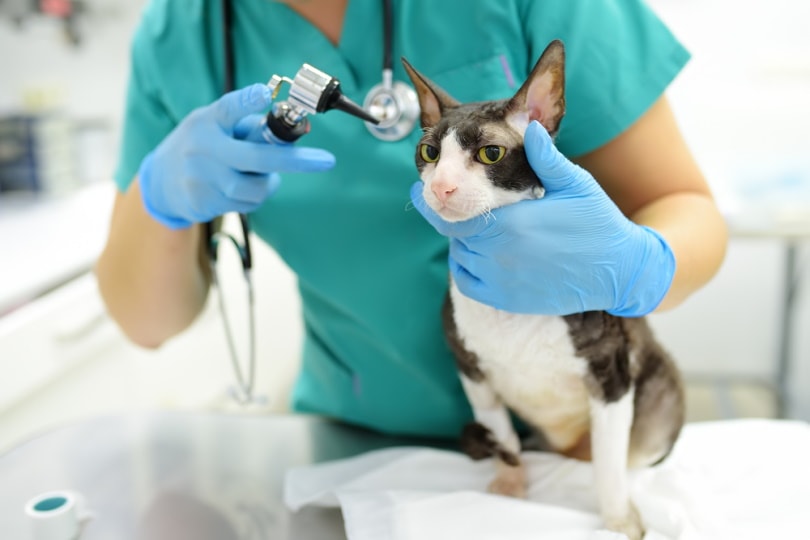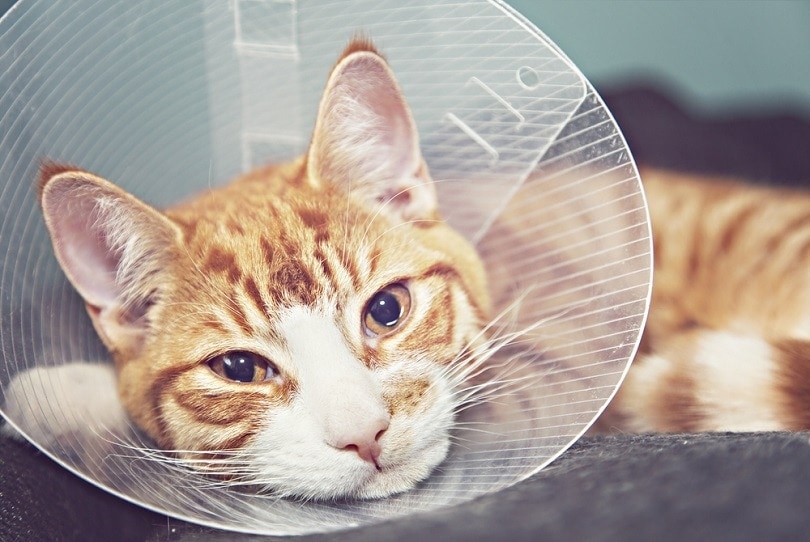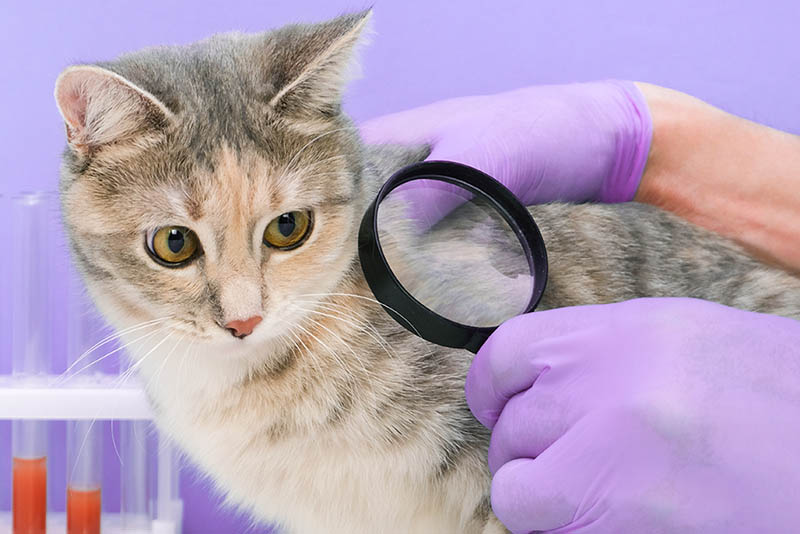How Do Vets Treat Ear Mites in Cats? Facts & FAQ (Vet Answer)

Updated on

Cats are generally mysterious beings. However, in recent times, your cat may be displaying alarming behavior. He may be shaking his head and scratching his ears at a much higher intensity and frequency than usual. He may be tearing off clumps of fur from the skin around his ears. His ear canals may look redder than usual. To top it off, there may be large amounts of dark, smelly discharge from his ears!
In case you’re wondering, your cat is not possessed! He is showing signs of an ear infection. Healthy cat ear canals have small amounts of bacteria and yeast. An ear infection refers to an overgrowth of bacteria and/or yeast in the cat’s ear canal.1 One or both ears may be affected. Ear mites are the most common cause of ear infections in cats.2 These parasites are otherwise known as Otodectis cynotis.3 They mostly live in affected cats’ ears, but can also be found on their skin. Vets treat ear mites by cleaning your cat’s ears and applying ear drops. Sometimes they will medicate other treatments such as flea treatments.
Should I Take My Cat to the Vet for Ear Mites?
If you believe that your cat has an ear infection, take him to your local veterinarian without delay! It can be tempting to diagnose your cat by yourself and try home remedies or over-the-counter products. However, there are several possible causes of ear infections in cats (e.g., foreign objects in the ear, food allergies). The root cause(s) of your cat’s ear infection can only be determined with proper testing by a qualified veterinarian. Different root causes will require different medications.If you medicate your cat without seeking veterinary advice, you risk giving the wrong type of medication. This will be a waste of time and money as your cat’s condition will not improve, and may even worsen. Even if you choose the correct drug, you risk giving incorrect doses that could harm your precious cat! If ear infections are not treated promptly, they can spread to the middle and inner ears. As a result, your cat may develop serious medical issues such as deafness, loss of balance, facial paralysis, seizures, and so on.
This article will explain how vets diagnose and treat ear mites in cats. This article will also explain how your veterinarian can help you to get rid of ear mites in cats fast!

How Do Vets Diagnose Ear Mites in Cats?
During your cat’s physical exam, your veterinarian will use a veterinary otoscope to check your cat’s ears. An otoscope is a specialized instrument that can check for foreign objects in ear canals. It can also assess the extent of ear canal inflammation. If your cat is cooperative, your vet may be able to view his eardrums with the otoscope.
Your veterinarian will then take an ear swab from your cat and examine the sample under a microscope. This procedure can help them to diagnose bacterial ear infections, fungal ear infections, and ear mites in cats. Although ear mites may be visible with an otoscope, microscopic examinations are the best way to diagnose ear mites in cats.
How Do Vets Treat Ear Mites in Cats?
To begin with, your cat’s ears will be thoroughly cleaned with a pet-friendly ear cleanser. Ear cleaning breaks down debris in your cat’s ear canals. This improves the effectiveness of medicated ear drops, as the debris will not “shield” the mites from the medication. Several kinds of medicated ear drops can treat ear mites in cats. Many spot-on flea treatments can also treat ear mites in cats. When tailoring your cat’s treatment plan, your vet will consider several factors (e.g., your cat’s age and pregnancy status). You will be able to complete your cat’s treatment at home.
Your vet may recommend that you place your cat on the dreaded “cone of shame”. This is to prevent your cat from scratching at his ears and damaging his skin. Instead of using uncomfortable plastic cones, you can buy cloth cones in various designs and colors. If the skin around your cat’s ears is already infected from repeated scratching, your vet will prescribe antibiotic therapy.
Notably, not every case is the same. Some cats with ear mites may be suffering from additional complications such as middle and inner ear infections. These cases are harder to cure, and they usually require at least several weeks of treatment. If your cat is one such case, your vet will explain the required treatment in detail.

Are Ear Mites in Cats Contagious?
It is very rare for Otodectis cynotis to affect humans. However, these parasites are extremely contagious to other cats and dogs! Therefore, if you have multiple pets, your veterinarian will want to examine and treat all of them for ear mites — even if they are not showing any symptoms!
Your vet will ask you to isolate the affected pets from the rest of your fur friends. Although your furry pals may be best friends and it may be difficult to separate them, it must be done for the greater good. If you do not isolate your affected pets, there will be back-and-forth transmission of ear mites amongst your pets. Therefore, it will take longer to treat ear mites in your pets and you will have to spend more money in the long run.
How Long Does It Take To Treat Ear Mites in Cats?
The life cycle of Otodectes cynotis is ~3 weeks. This means that most treatment regimens take at least 3–4 weeks to cure your cat of ear mites. We get it — you may be frustrated. You may worry that if you repeatedly manhandle your cat’s ears, the bond between you and your cat will be permanently damaged. It is worse if you must handle multiple pets with the same issue. At this stage, you may wonder, “How many treatments does it take to get rid of ear mites in cats? Is there a one-time treatment for ear mites in cats?”
Good news! There are some medicated ear drops and spot-on treatments that only need to be applied once, as they remain effective throughout the ear mites’ entire life cycle. However, certain criteria must be met before your cat is eligible for these one-time treatments. For instance, some of these medicated ear drops treat only ear mites in cats. Thus, your cat may not be suitable for these one-time medicated ear drops if he has ear mites AND bacterial/fungal overgrowth in his ears. Speak to your vet about your cat’s suitability for these one-time treatments!
When you treat your cat for ear mites, it is important to follow your veterinarian’s instructions. You should complete the entire course of treatment, even if your cat’s symptoms disappear after a few days. This is because low levels of mites may remain in your cat’s ears. If these mites are not killed off, they will multiply and re-trigger your cat’s symptoms with a vengeance! You may also get an earful from your vet for not completing the entire course! If you are unsure about cleaning and medicating your cats’ ears, your vet will be happy to demonstrate!
What Happens After My Cat Has Finished His Treatment for Ear Mites?
Your veterinarian will recommend a revisit to check that your cat has fully recovered after finishing his treatment regime. If your cat has not fully recovered, your vet will troubleshoot your cat’s specific situation and adjust the treatment plan accordingly.
Your veterinarian may also recommend some spot-on preventatives to protect your cat against future episodes of ear mites! You can apply these preventatives at regular intervals, according to your vet’s instructions.
Conclusion
If you want to get rid of ear mites in cats fast, you should quickly take your cat to the vet for ear mites. Your cat may try to murder you in the process, and you may feel guilty for stressing him out. However, untreated ear mites can cause extreme discomfort and serious health issues in cats. Therefore, you’re improving your cat’s welfare by taking him to your vet!
Featured Image Credit: Uryupina Nadezhda, Shutterstock












